The Electronic Intifada 3 March 2017
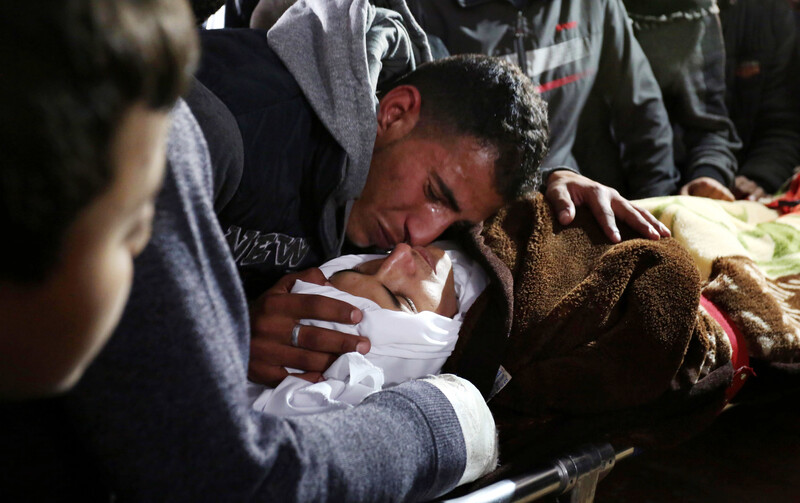
Palestinians mourn over the body of Obeid Sufi, 25, during his funeral in Rafah, southern Gaza Strip, on 25 February. Sufi was among three workers who died after inhaling poisonous gas inside a tunnel under the border between Gaza and Egypt.
APA imagesDuring the month of February, a Palestinian died at an Israeli hospital where he was being treated after being shot by soldiers months earlier.
Muhammad Jallad was on his way to a chemotherapy session on 9 November when he was shot while crossing a street in the village of Huwwara in the northern occupied West Bank. The army claimed he was attempting to attack soldiers with a screwdriver.
An elderly man was shot in the foot and pelvis by soldiers at the same location on 28 February. The army claimed that Hussein Hassan Qawariq, 72, did not obey the soldiers’ commands before he was shot.
A Palestinian woman was shot and injured by a security guard at the Qalandiya checkpoint between the West Bank cities of Ramallah and Jerusalem one day earlier. The army claimed she was walking in the vehicle lane at the checkpoint while carrying a bag in a “suspicious manner” and did not heed the guards’ orders to stop.
A Palestinian youth from the West Bank was arrested after he allegedly injured six people during a shooting and stabbing attack in Petah Tikva, a city in Israel, on 9 February. A Palestinian citizen of Israel was attacked by a crowd of Israelis during the incident after shouting “Warning! Take cover!” in Arabic, Israel’s Ynet reported.
An elderly Palestinian man died after being run over by an Israeli settler.
Fisherman in critical condition
Israeli forces opened fire on Palestinians in Gaza along the boundary with Israel and at sea, disrupting the work of farmers and fishermen. A fisherman was in critical condition after being shot in the back while being detained off Gaza’s coast on 21 February.
Gaza was hit by Israeli airstrikes on two occasions during the month, injuring two civilians and damaging agricultural land and a poultry farm on 6 February and injuring four Palestinians during multiple airstrikes on 27 February. Both incidents occurred after rockets fired from Gaza landed in southern Israel, causing no injuries or damage.
Seven Palestinians were killed in Gaza tunnels during February.
Hamas authorities in Gaza accused Egypt of filling a tunnel with poisonous gas that caused three workers to suffocate to death. Another worker died when Egypt flooded the tunnel he was in.
Two more tunnel workers were killed in what the Gaza ministry of health said was an Israeli airstrike on Rafah in southern Gaza, but the Israeli military denied involvement in the reported strike.
A fighter with the Qassam Brigades, the armed wing of Hamas, died when a tunnel used for “resistance” purposes collapsed on him.
Rafah crossing, the sole point of exit and entry for the vast majority of the 2 million Palestinians in Gaza, was opened for three days for entry to Egypt and one day for exit to Gaza, allowing more than 1,500 Palestinians to leave and nearly 1,400 to return to Gaza.
Rafah was closed by Egypt in October 2014 and is opened with rare exception. The crossing was partially opened only 44 days last year.
“According to the Palestinian authorities in Gaza, over 20,000 people, including humanitarian cases, are registered and waiting to cross,” the United Nations monitoring group OCHA reported in February.
Disparate sentences
An Israeli army medic was sentenced to 18 months in prison for shooting an immobilized Palestinian in the head last year, killing him, while an Israeli who stabbed and injured another Israeli who he mistook for a Palestinian was sentenced to 11 years imprisonment.
Palestinian teens, one of them a minor, were sentenced to 12 years and 15 years imprisonment for stabbing attacks on Israelis. A 16-year-old Palestinian girl was sentenced to 6 years in prison after Israeli police found a knife in her bag.
Police forces evacuated two West Bank settlement outposts not authorized by the Israeli government during the month.
Israel tightened restrictions on Palestinian movement throughout the Ramallah area during the evacuation of 250 settlers from Amona. “This negatively affected the movement of tens of thousands of Palestinians, particularly those commuting between the northern and southern West Bank,” OCHA reported.
Dozens of police officers were reportedly injured during the Amona operation, according to OCHA, while a police spokesperson told media that 11 officers sustained “minor bruises and even bites” during the evacuation of nine unauthorized homes in Ofra settlement.
Meanwhile, Israel’s parliament, the Knesset, passed a bill that would retroactively legalize the expropriation of privately owned Palestinian land throughout the West Bank.
Bedouin villages under threat
The Bedouin village of al-Araqib in southern Israel was demolished for the 109th time and Israel delivered stop work and demolition orders against nearly all structures in the Bedouin community of Khan al-Ahmar near Jerusalem.
“Among the targeted structures is a donor-funded primary school made of tires and mud, which serves around 170 children from five Palestinian Bedouin communities,” OCHA reported.
“Khan al-Ahmar is one of the most vulnerable communities in the West Bank, struggling to maintain a minimum standard of living in the face of intense pressure from the Israeli authorities to move to a planned relocation site,” stated Robert Piper, the UN Coordinator for Humanitarian Aid and Development Activities for the occupied Palestinian territory.
Two people, including a child, were killed during fighting in Ein al-Hilweh, the largest Palestinian refugee camp in Lebanon.
The Action Group for Palestinians in Syria reported that 25 Palestinians died as a result of the ongoing war there during February.
Fifteen were said to be combatants killed during fighting alongside both government and opposition forces. Two were executed by Islamic State fighters. Another two were reportedly killed under torture in Syrian government detention, and several more were killed by sniper fire, shelling and in air strikes.
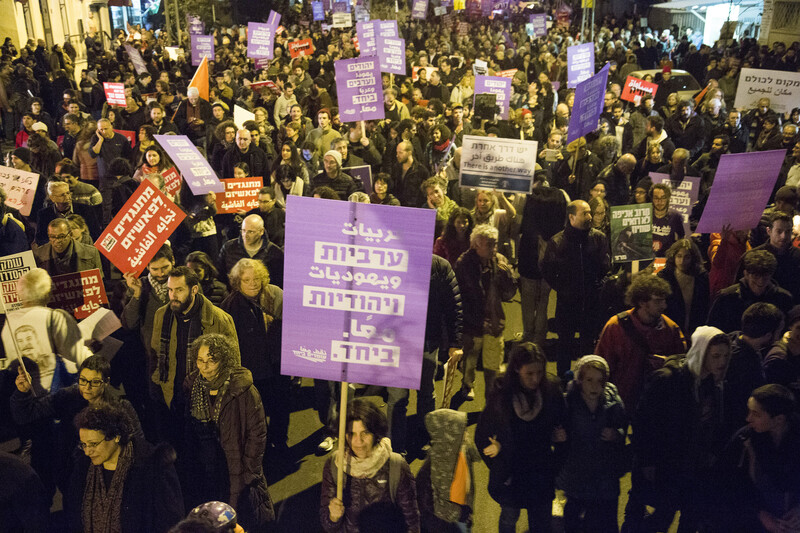
Thousands march in Tel Aviv during a demonstration against house demolitions and incitement against Palestinian citizens of Israel. The demonstration took place after mass demolitions in the Palestinian town of Qalansawa and in the Bedouin Palestinian village of Umm al-Hiran, during which a resident was killed by police. The demonstrators called on Prime Minister Benjamin Netanyahu and public security minister Gilad Erdan to resign.
ActiveStills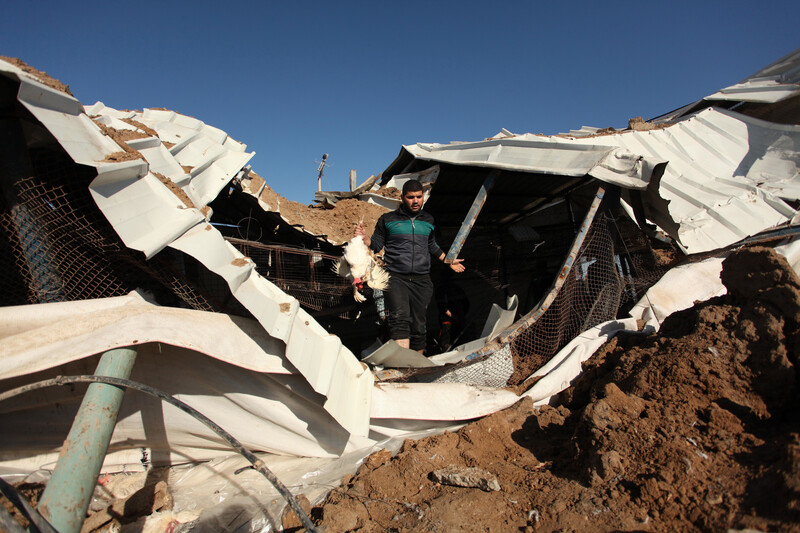
A Palestinian inspects a poultry farm damaged in an Israeli airstrike in Gaza City’s eastern suburb of Shujaiya on 7 February.
APA images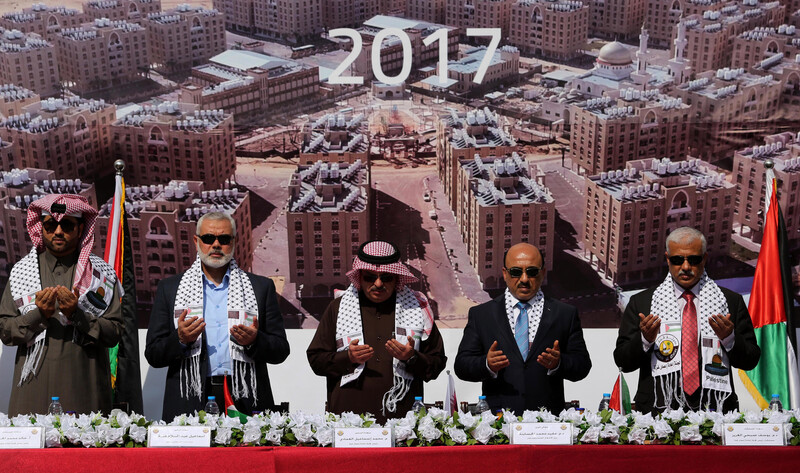
Hamas leader Ismail Haniyeh (second from left) and Mohammed Al-Emadi (center), Qatar’s ambassador to the Palestinian Authority, preside over a ceremony marking the second phase of a Qatar-funded housing project in Khan Younis, southern Gaza Strip, 11 February.
APA images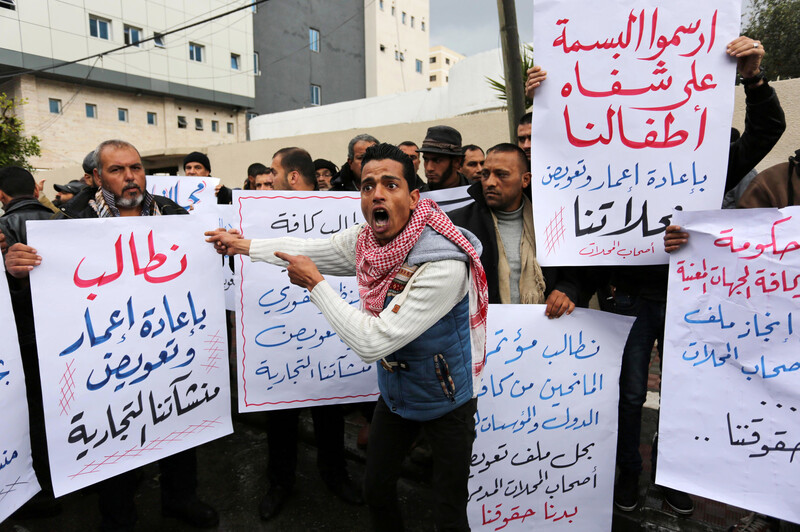
Owners of factories destroyed during Israel’s assault on Gaza in summer 2014 hold a protest in Gaza City demanding their reconstruction, 14 February.
APA images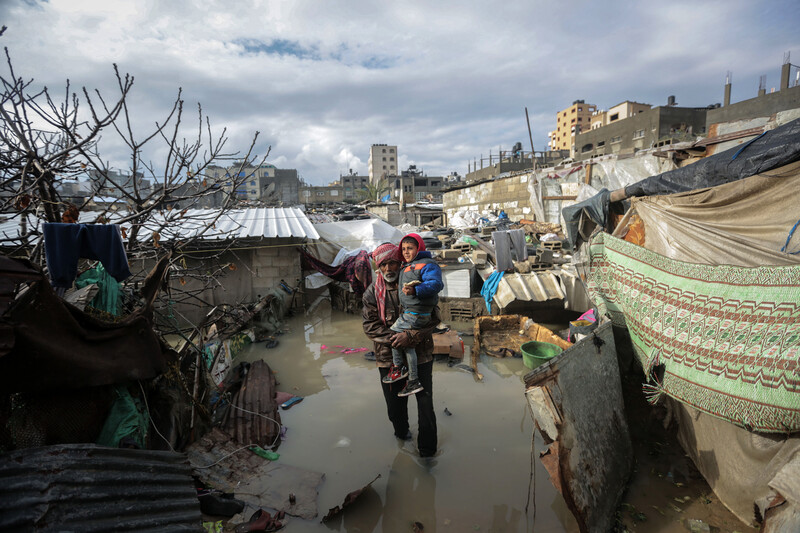
A Palestinian man evacuates a child in a flooded quarter of Jabaliya refugee camp, Gaza Strip, 16 February. Heavy winter rains have caused flooding across Gaza, overwhelming the territory’s fragile sewage system.
ActiveStills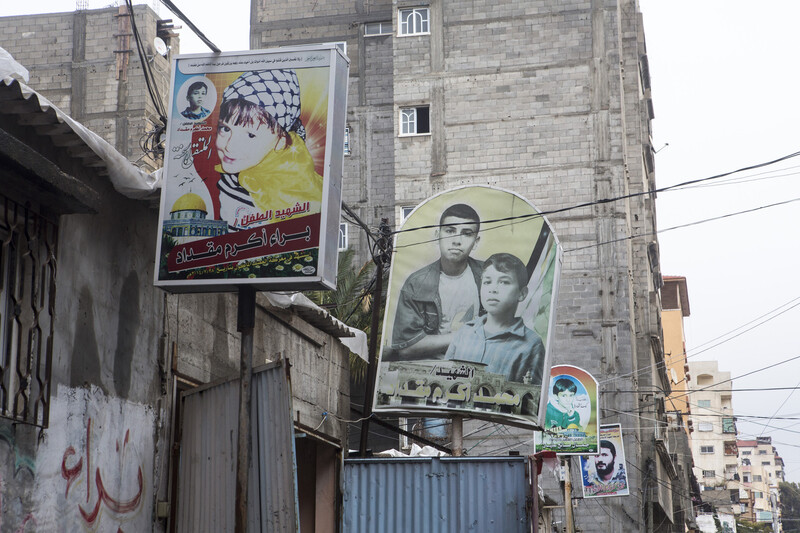
Posters of children killed during Israel’s 2014 assault are displayed in al-Shati refugee camp, Gaza City, 16 February.
ActiveStills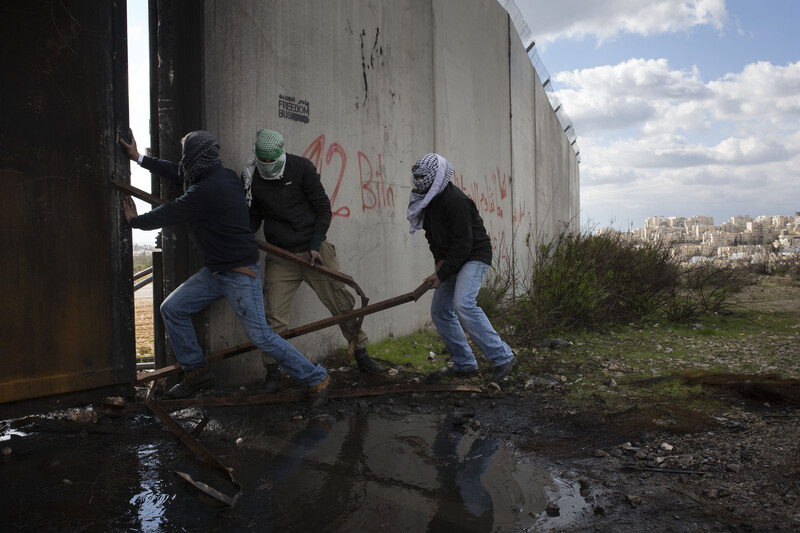
Palestinian youths force open a gate in Israel’s wall during a protest marking 12 years of struggle against the wall and the occupation in the West Bank village of Bilin, 17 February.
ActiveStills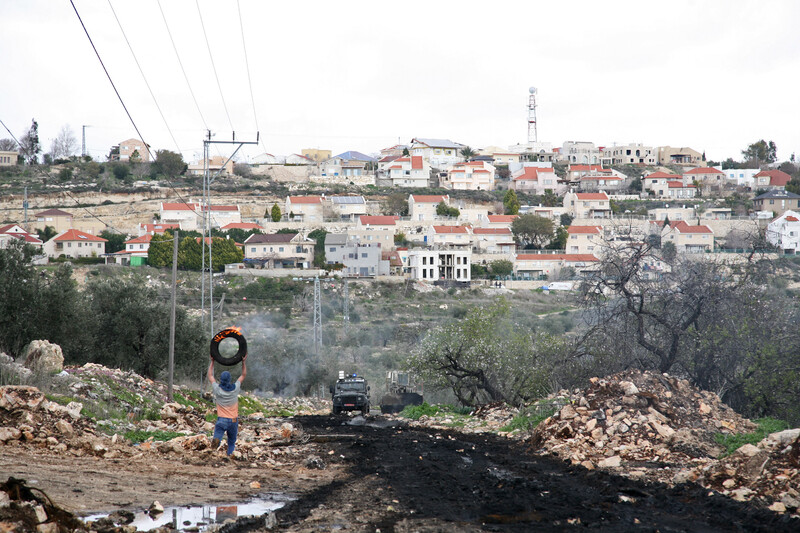
A demonstrator in the West Bank village of Kafr Qaddum holds up a burning tire in front of an Israeli military jeep during a protest against the occupation, 17 February. Kafr Qaddum began organizing weekly demonstrations in July 2011 to protest the army’s closure of the main road connecting the village to the city of Nablus.
ActiveStills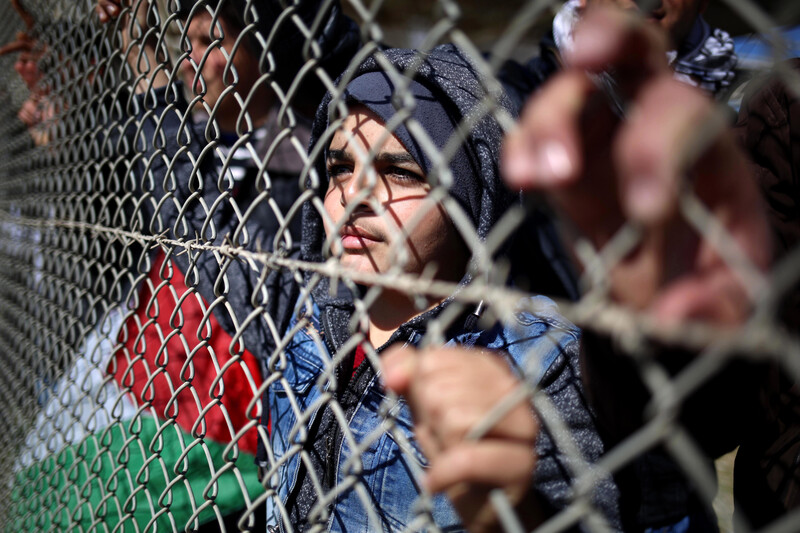
Palestinians wait for the arrival of their family members at Rafah crossing after it was opened by Egypt to allow stranded Palestinians to return to Gaza, 18 February.
APA images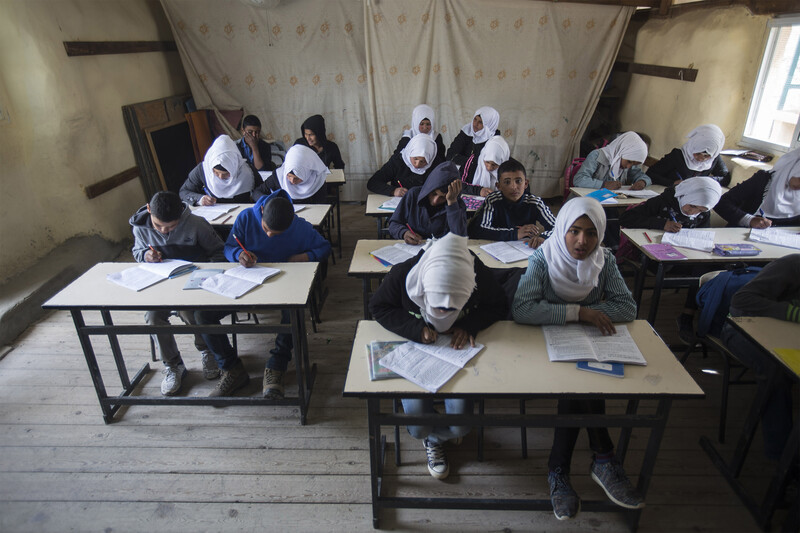
Students sit in a classroom at the school in the Jahalin Bedouin community of Khan al-Ahmar near Jerusalem on 22 February. Israeli authorities delivered stop work and demolition orders affecting nearly every structure in the community, including the school which serves some 170 children from five communities.
ActiveStills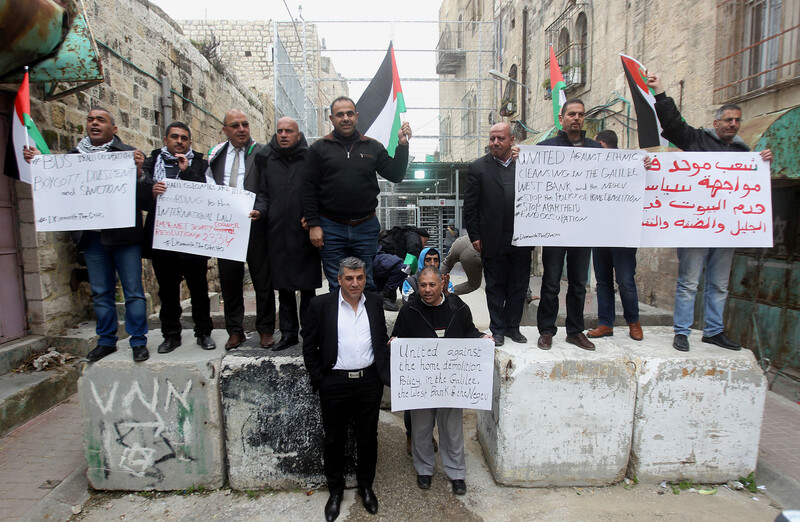
Palestinians protest on the 23rd anniversary of Israel’s closure of Shuhada Street in the West Bank city of Hebron on 22 February. Israel closed the main street and marketplace in February 1994 after an American settler opened fire on and massacred worshippers in Hebron’s Ibrahimi mosque.
APA images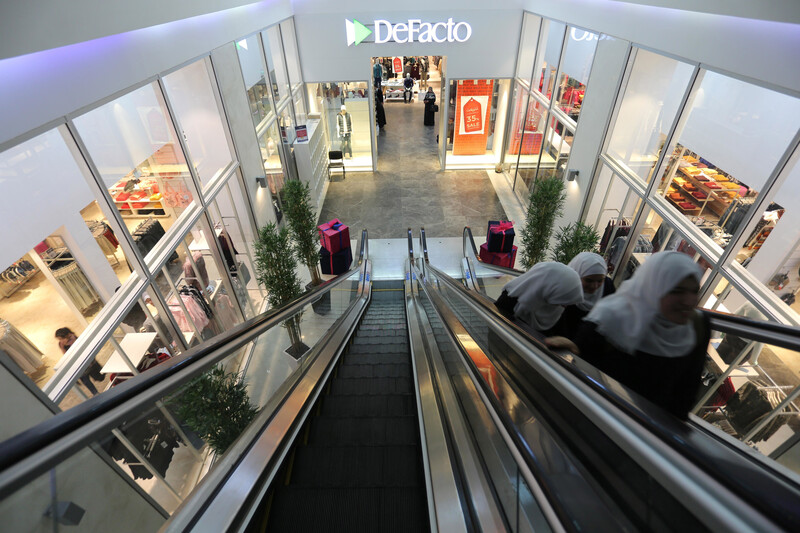
Palestinians shop in a new indoor mall, the first of its kind in the Gaza Strip, featuring an international retail chain, three-story bookstore and food court, on 23 February.
APA images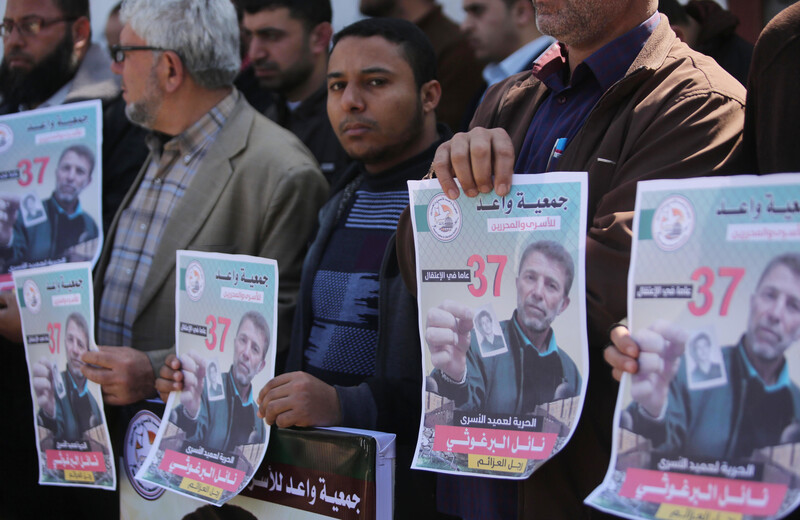
Palestinians hold a rally to show solidarity with Nael Barghouthi, the longest-held Palestinian in Israeli prison, in Gaza City on 23 February. Barghouti was first arrested at the age of 20 in 1978 and released in a prisoner swap in 2011 but arrested a few years later. An Israeli military court reinstated his previous life sentence plus an additional 18 years in February. Barghouti has spent more than 35 years in Israeli prison, according to the rights group Addameer.
APA images
Palestinian workers queue at an Israeli military checkpoint in the West Bank city of Bethlehem on 26 February. Thousands of Palestinian workers from the south of the West Bank come to the checkpoint before dawn each day in order to be on the other side as early as possible.
ActiveStills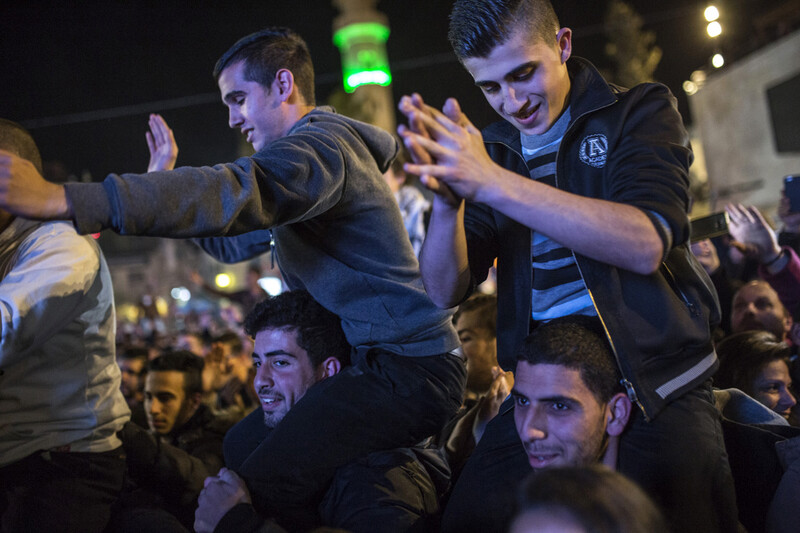
Palestinians gather in Manger Square in the West Bank city of Bethlehem to watch the finale of the popular TV show Arab Idol and cheer for Yacoub Shaheen, a local singer, on 26 February. Shaheen became the second Palestinian to win the singing competition after Mohammed Assaf from the Gaza Strip who won the title in 2013.
ActiveStills

